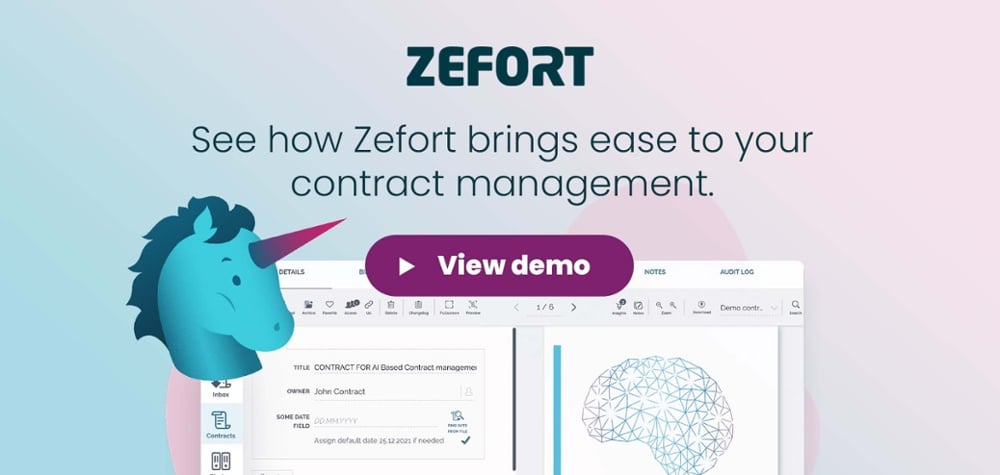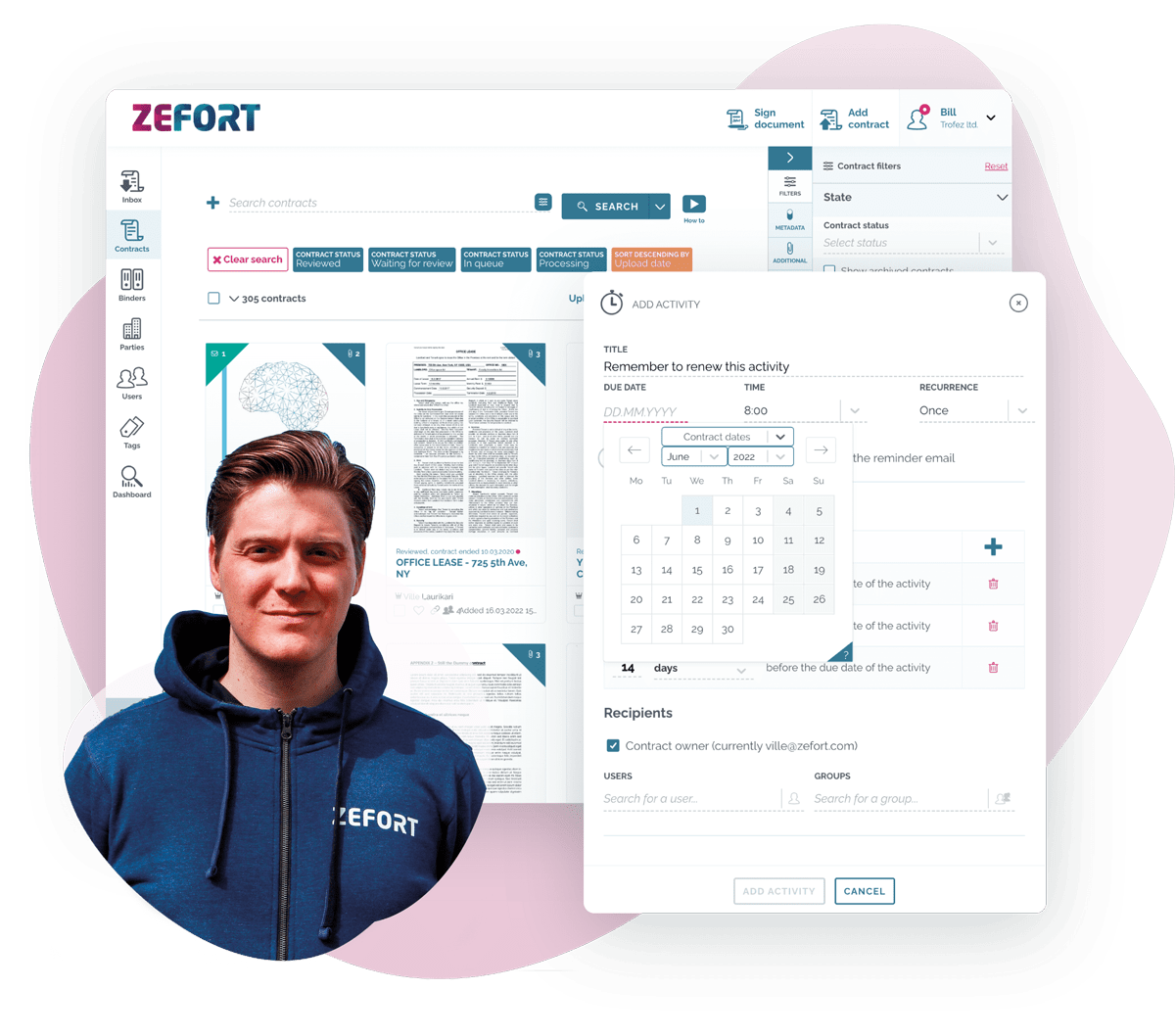Are you a small business owner juggling multiple contracts, struggling to keep track of important deadlines, and missing out on potential opportunities for growth? If so, you’re not alone. Managing contracts can be a daunting task, especially when you’re trying to focus on running a business. That’s where contract management software comes in to save the day.
In this article, we’ll explore why contract management software is crucial for small business owners and how it can simplify your life, boost productivity, and pave the way to success. So, grab a cup of coffee, sit back, and let’s dive into the world of contract management.
The Importance of Contracts for Small Businesses
Contracts are fundamental for small businesses as they establish clear expectations, rights, and obligations between parties involved. These legally binding agreements protect businesses from potential disputes, ensuring that all parties are on the same page. Contracts specify the terms of service, payment agreements, delivery schedules, and more, giving small business owners the confidence to conduct business securely and efficiently. Without contracts, businesses might face uncertainties, misunderstandings, and potential financial loss.
The Challenges of Manual Contract Management
The challenges of manual contract management are numerous and can greatly impact small business owners. Here are the key points to consider:
- Human error: Manually managing contracts increases the risk of mistakes in contract creation, data entry, and storage. These errors can lead to disputes, legal issues, and even financial losses.
- Time-consuming processes: Managing contracts manually requires significant time and effort, involving tasks such as drafting, printing, scanning, and filing. This can take valuable time away from other essential business activities.
- Lack of visibility: Without a centralized storage system, it becomes difficult to track contract status, renewal dates, and key obligations. This lack of visibility increases the chances of missing critical deadlines and opportunities.
- Limited accessibility: Physical or scattered document storage makes it hard to access contracts when needed. Remote collaboration and sharing become challenging, potentially hindering business operations.
- Inefficient workflow: Manual contract management lacks automation, resulting in a slow and inefficient workflow. Multiple approval steps, missing signatures, and delays in contract execution can hinder business growth.
- Poor organization: Paper-based contracts can easily get misplaced or lost, leading to confusion and legal risks. Retrieving specific contracts or relevant information becomes time-consuming and arduous.
- Inadequate risk management: Without proper contract tracking and analysis, identifying potential risks becomes challenging. Manual methods lack the ability to proactively mitigate risks and ensure compliance.
- Difficulty in reporting and analysis: Manual contract management lacks robust reporting capabilities, making it hard to analyze contract performance, identify trends, and make data-driven decisions.
Overall, manual contract management poses substantial challenges for small business owners in terms of accuracy, efficiency, visibility, and compliance. Adopting contract management software can help overcome these challenges and streamline the entire contract lifecycle.
Benefits of Contract Management Software for Small Business Owners
Having a contract management solution in place can offer several benefits for businesses of all sizes. Here are some of the top benefits:
- Centralized contract repository: Contract management software allows small business owners to store all their contracts in one central location, making it easy to access and retrieve contracts whenever needed.
- Customizable workflows: Contract management software offers customizable workflows, allowing small business owners to create a step-by-step process for contract creation, review, approval, and execution. This ensures that all necessary steps are followed for each contract, reducing the risk of missing important details.
- Collaboration and version control: The software facilitates collaboration among team members involved in contract creation and allows them to work on contracts simultaneously. It also keeps track of different versions of the contract, making it easy to identify and revert to previous versions if needed.
- Intelligent contract search: With a search feature, small business owners can quickly find specific contracts by various criteria such as contract types, parties involved, or specific terms. This saves valuable time and ensures efficient contract management.
- Contract renewal reminders: Contract management software can send automated reminders for contract renewals or upcoming expiration dates. This feature helps small business owners to stay on top of their obligations and prevents contracts from unintentionally lapsing.
Overall, contract management software simplifies the process of contract creation, organization, and retrieval, ensuring small business owners have better control and visibility over their contracts.
Top Features to Consider in Contract Management Software
Contract Creation and Template Management
- Simplifies the process of creating contracts by providing pre-defined templates that can be customized
- Allows small business owners to easily generate new contracts by filling in relevant information and clauses
- Ensures consistency and accuracy in contract language and terms by using standardized templates
- Enables the creation of contract templates that can be reused for similar agreements, saving time and effort
- Provides a centralized repository for storing and managing contract templates, making them easily accessible for future use
- Facilitates updating and version control of contract templates, ensuring that the latest versions are always utilized
- Allows for the customization of templates based on specific business requirements, industry regulations, or legal changes
- Prevents the risk of using outdated or incorrect contract templates
- Increases efficiency by eliminating the need to start contracts from scratch each time
- Improves compliance by incorporating legal and regulatory requirements into contract templates.
Document Storage and Organization
Document Storage and Organization: This feature in contract management software enables small business owners to effectively store and organize all their contract-related documents. It allows for a centralized repository where contracts can be securely stored and easily accessed whenever needed.
Benefits of Document Storage and Organization:
- Easy Retrieval: With contract management software, small business owners can quickly locate specific contracts by utilizing search functions or sorting options based on parameters such as dates, parties involved, or contract types. This eliminates time wasted searching through physical files or various computer folders.
- Centralized Repository: Contract management software provides a centralized location to store all contracts, eliminating the hassle of maintaining multiple physical or digital storage systems. This ensures that all important contracts are kept in one secure place.
- Document Version Control: Small business owners can keep track of revisions and changes made to contracts with the version control feature offered by contract management software. This helps avoid confusion and ensures the use of the most up-to-date contract version.
- Secure Access and Permissions: Contract management software allows small business owners to set access permissions for different individuals or teams. This ensures that only authorized personnel can view or edit specific contracts, adding an extra layer of security and confidentiality.
- Document Organization: The software provides options for categorizing contracts by type, project, or client, making it simpler to locate relevant documents.
Additionally, contracts can be tagged with keywords or labels, enabling even more efficient searching and organizing.
Overall, document storage and organization within contract management software simplifies the process of managing contracts, improves accessibility, and enhances workflow efficiency for small business owners.
Automated Alerts and Reminders
Automated Alerts and Reminders are an essential feature of contract management software that helps small business owners stay on top of their contracts. This feature ensures that important dates, deadlines, and milestones related to contracts are never missed or overlooked.
With automated alerts, the software sends notifications to designated individuals or teams when a crucial event is approaching, such as contract expiration, renewal, or payment due dates. These reminders can be set up in advance, eliminating the need for manual tracking and reducing the risk of oversight.
By receiving timely alerts, small business owners can take proactive measures to meet contractual obligations, avoid penalties, and initiate necessary actions well in advance. This not only saves time but also helps maintain positive relationships with clients, suppliers, and other business partners.
Automated alerts can be customized according to specific contract terms and requirements, allowing users to prioritize notifications based on their significance. These alerts can be delivered through various channels, including email, SMS, or within the contract management software itself, ensuring that the right people are informed promptly.
In addition to reminders for key contract dates, automated alert systems can also notify users about contract milestones, such as project progress, deliverable deadlines, or review periods. This facilitates effective project management and enables businesses to track the status of ongoing contracts with ease.
Overall, the automated alerts and reminders feature of contract management software is crucial for small business owners as it helps them maintain contract compliance, mitigate risks, and ensure smooth operations.
Integration and Compatibility with Existing Systems
- Seamless integration: Contract management software should be able to seamlessly integrate with the existing systems and software your small business uses. This ensures a smooth workflow and eliminates the need for manual data entry or duplication.
- CRM and ERP integration: If your small business utilizes customer relationship management (CRM) or enterprise resource planning (ERP) systems, it is essential that the contract management software is compatible with these platforms. This integration enables a centralized approach to managing contracts and provides a holistic view of customer interactions.
- Data synchronization: Ideally, the contract management software should sync seamlessly with other systems, ensuring that the contract-related data, such as customer details or pricing information, remains consistent and up-to-date across all platforms.
- Bi-directional data flow: The software should support bi-directional data flow, allowing information to be transferred from the contract management system to other platforms and vice versa. This functionality ensures that changes made in one system are reflected in the others, reducing the risk of data inconsistencies or errors.
- API availability: An application programming interface (API) allows for custom integrations with other software applications that might be specific to your business. Contract management software with API availability gives you the flexibility to connect and exchange data with specialized tools or systems unique to your operations.
In conclusion, integration and compatibility with existing systems ensure that the contract management software you choose fits seamlessly into your small business operations. It eliminates the need for manual data entry, enhances workflow efficiency, and provides a cohesive view of contract-related information across different platforms.
How to Choose the Right Contract Management Software for Your Small Business
Assessing Your Business Needs and Budget
- Determine what specific contract management needs your small business has. Consider factors such as the volume of contracts, complexity, and recurring patterns.
- Evaluate your budget constraints and identify how much you can invest in contract management software without impacting other critical areas of your business.
- Prioritize the features and functionalities that align with your business needs and also fit within your budget.
- Consider any future growth projections and determine if the software can scale accordingly without significant additional costs.
Considering Scalability and Growth Potential
- Projecting future needs: When choosing contract management software for your small business, it’s crucial to consider how the software can accommodate your growing business. This entails assessing whether the software can handle an increasing number of contracts and users as your business expands.
- Scalable storage capacity: As your business grows, you will generate more contracts and associated documents. It is essential to choose software that offers ample storage capacity to handle the increasing volume of contracts and related files. This ensures that you won’t encounter limitations or incur additional costs for storage upgrades in the future.
- User management capabilities: While considering scalability, it is essential to assess whether the software can easily accommodate additional users as your team expands. Look for software with flexible user management features that allow you to add or remove users, assign permissions, and define roles without significant hassle or extra expenses.
- Customization options: Scalability also implies the ability to customize the software to match your evolving needs. Ensuring that the contract management software allows for customization allows you to adapt the system to your specific business processes and workflows as they change over time.
- Integration capabilities: As your business grows, the need for integration with other systems, such as customer relationship management or enterprise resource planning software, becomes more critical.
Consider whether the contract management software offers integration capabilities with these existing systems or whether it can allow for integration in the future as your business requirements progress.
By considering scalability and growth potential while selecting contract management software, small business owners can invest in a solution that can evolve with their business, accommodate increased contract volumes and users, provide ample storage, and integrate with other crucial systems, ensuring long-term success and efficiency.
Testing and Comparing Different Software Options
Testing and comparing different software options is an important step in choosing the right contract management software for your small business. This process allows you to assess the features, functionality, and overall suitability of each software option before making a final decision. Here are a few key points to consider while testing and comparing different software options:
- Set up a trial period: Most software providers offer trial periods that allow you to test the software firsthand. Take advantage of these trials to get a feel for the user interface, navigation, and general usability of the software.
- Evaluate ease of use: Pay attention to how intuitive and user-friendly the software is. Look for a solution that doesn’t require extensive training or technical expertise to operate effectively.
- Consider customization options: Assess whether the software can be easily customized to meet your specific business needs. Look for options to tailor fields, templates, and workflows to align with your contract management processes.
- Test integration capabilities: If you already use other business software, check if the contract management software can seamlessly integrate with these systems. Compatibility and integration with existing tools can enhance efficiency and reduce duplication of work.
- Assess customer support: Look into the customer support provided by the software vendor. Check if they offer timely and helpful support, respond to inquiries promptly, and provide comprehensive documentation or training resources.
- Seek user feedback and reviews: Research user feedback and reviews to gain insights into the experiences of other small business owners who have used the software. Consider the credibility and relevance of the sources to make an informed decision.
- Compare costs and pricing models: Examine the pricing structures of different software options.
Consider factors such as upfront costs, subscription fees, additional modules or add-ons, and ongoing maintenance and support costs.
By thoroughly testing and comparing different software options based on these key points, you can choose a contract management solution that suits the unique needs of your small business and maximizes your efficiency in managing contracts.
Summary
Small business owners face numerous challenges in managing their contracts effectively. Fortunately, contract management software has emerged as a crucial tool to simplify and streamline this process. This software offers a plethora of benefits for small businesses, such as improved efficiency, reduced errors, increased compliance, enhanced collaboration, and enhanced visibility into contract data.
Contract management software significantly improves efficiency by automating various tasks. It eliminates the need for manual entry, retrieval, and tracking of contracts, saving valuable time and effort. With features like templates and e-signatures, businesses can accelerate the contract creation and approval process, enabling them to close deals quickly.
In conclusion, contract management software plays a vital role in helping small business owners efficiently manage their contracts. By automating tasks, reducing errors, ensuring compliance, promoting collaboration, and providing visibility into contract data, this software empowers businesses to optimize their contract management processes and focus on their core operations.






